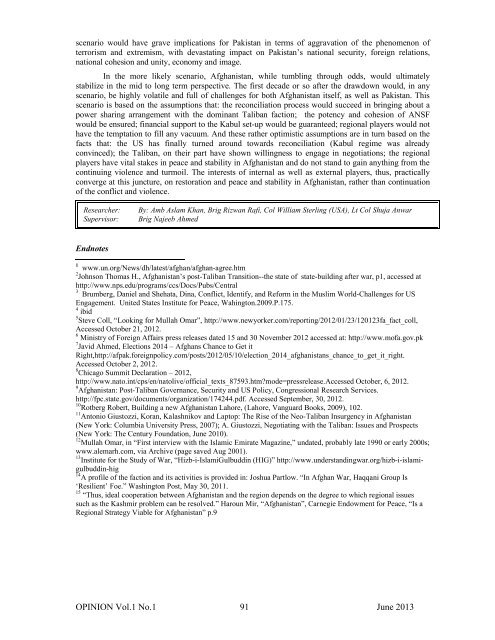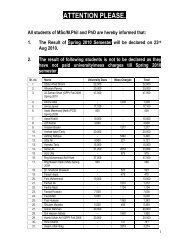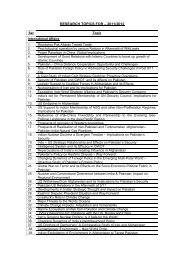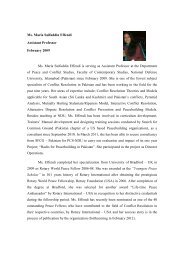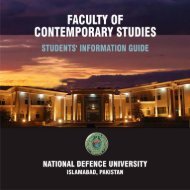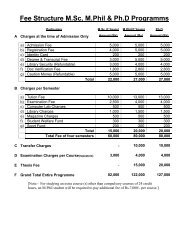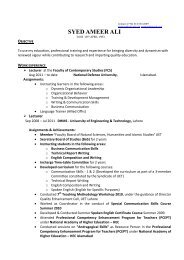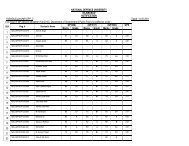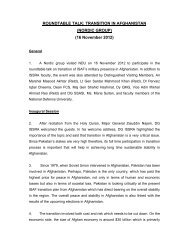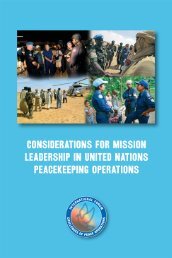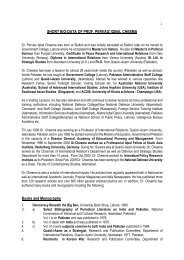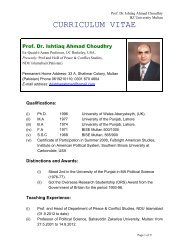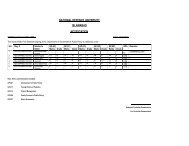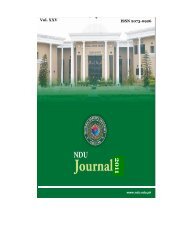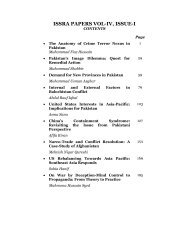OPINION Vol.1, No.1 June 2013 - National Defence University
OPINION Vol.1, No.1 June 2013 - National Defence University
OPINION Vol.1, No.1 June 2013 - National Defence University
You also want an ePaper? Increase the reach of your titles
YUMPU automatically turns print PDFs into web optimized ePapers that Google loves.
scenario would have grave implications for Pakistan in terms of aggravation of the phenomenon of<br />
terrorism and extremism, with devastating impact on Pakistan’s national security, foreign relations,<br />
national cohesion and unity, economy and image.<br />
In the more likely scenario, Afghanistan, while tumbling through odds, would ultimately<br />
stabilize in the mid to long term perspective. The first decade or so after the drawdown would, in any<br />
scenario, be highly volatile and full of challenges for both Afghanistan itself, as well as Pakistan. This<br />
scenario is based on the assumptions that: the reconciliation process would succeed in bringing about a<br />
power sharing arrangement with the dominant Taliban faction; the potency and cohesion of ANSF<br />
would be ensured; financial support to the Kabul set-up would be guaranteed; regional players would not<br />
have the temptation to fill any vacuum. And these rather optimistic assumptions are in turn based on the<br />
facts that: the US has finally turned around towards reconciliation (Kabul regime was already<br />
convinced); the Taliban, on their part have shown willingness to engage in negotiations; the regional<br />
players have vital stakes in peace and stability in Afghanistan and do not stand to gain anything from the<br />
continuing violence and turmoil. The interests of internal as well as external players, thus, practically<br />
converge at this juncture, on restoration and peace and stability in Afghanistan, rather than continuation<br />
of the conflict and violence.<br />
Researcher:<br />
Supervisor:<br />
By: Amb Aslam Khan, Brig Rizwan Rafi, Col William Sterling (USA), Lt Col Shuja Anwar<br />
Brig Najeeb Ahmed<br />
Endnotes<br />
1 www.un.org/News/dh/latest/afghan/afghan-agree.htm<br />
2 Johnson Thomas H., Afghanistan’s post-Taliban Transition--the state of state-building after war, p1, accessed at<br />
http://www.nps.edu/programs/ccs/Docs/Pubs/Central<br />
3 Brumberg, Daniel and Shehata, Dina, Conflict, Identify, and Reform in the Muslim World-Challenges for US<br />
Engagement. United States Institute for Peace, Wahington.2009.P.175.<br />
4 ibid<br />
5 Steve Coll, “Looking for Mullah Omar”, http://www.newyorker.com/reporting/2012/01/23/120123fa_fact_coll,<br />
Accessed October 21, 2012.<br />
6 Ministry of Foreign Affairs press releases dated 15 and 30 November 2012 accessed at: http://www.mofa.gov.pk<br />
7 Javid Ahmed, Elections 2014 – Afghans Chance to Get it<br />
Right,http://afpak.foreignpolicy.com/posts/2012/05/10/election_2014_afghanistans_chance_to_get_it_right.<br />
Accessed October 2, 2012.<br />
8 Chicago Summit Declaration – 2012,<br />
http://www.nato.int/cps/en/natolive/official_texts_87593.htmmode=pressrelease.Accessed October, 6, 2012.<br />
9 Afghanistan: Post-Taliban Governance, Security and US Policy, Congressional Research Services.<br />
http://fpc.state.gov/documents/organization/174244.pdf. Accessed September, 30, 2012.<br />
10 Rotberg Robert, Building a new Afghanistan Lahore, (Lahore, Vanguard Books, 2009), 102.<br />
11 Antonio Giustozzi, Koran, Kalashnikov and Laptop: The Rise of the Neo-Taliban Insurgency in Afghanistan<br />
(New York: Columbia <strong>University</strong> Press, 2007); A. Giustozzi, Negotiating with the Taliban: Issues and Prospects<br />
(New York: The Century Foundation, <strong>June</strong> 2010).<br />
12 Mullah Omar, in “First interview with the Islamic Emirate Magazine,” undated, probably late 1990 or early 2000s;<br />
www.alemarh.com, via Archive (page saved Aug 2001).<br />
13 Institute for the Study of War, “Hizb-i-IslamiGulbuddin (HIG)” http://www.understandingwar.org/hizb-i-islamigulbuddin-hig<br />
14 A profile of the faction and its activities is provided in: Joshua Partlow. “In Afghan War, Haqqani Group Is<br />
‘Resilient’ Foe.” Washington Post, May 30, 2011.<br />
15 “Thus, ideal cooperation between Afghanistan and the region depends on the degree to which regional issues<br />
such as the Kashmir problem can be resolved.” Haroun Mir, “Afghanistan”, Carnegie Endowment for Peace, “Is a<br />
Regional Strategy Viable for Afghanistan” p.9<br />
<strong>OPINION</strong> <strong>Vol.1</strong> <strong>No.1</strong> 91 <strong>June</strong> <strong>2013</strong>


